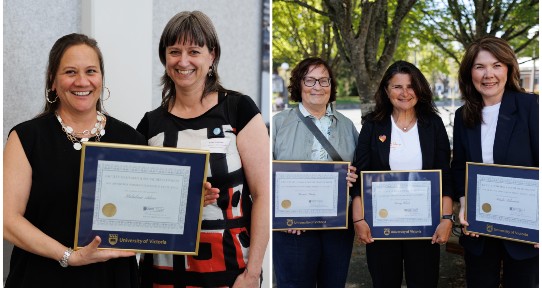All Health stories & announcements
Recent stories
Meet our research excellence winners
April 30, 2025
The winners of this year’s HSD Research Excellence Awards are changemakers who mobilize knowledge for good. Three Nursing faculty members and an Indigenous Governance scholar were...
Legacy honoured on Indigenous Nurses Day
The first Indigenous woman to become a registered nurse in Canada—Edith Monture—was a powerful matriarch whose legacy continues to inspire nurses today. Fourth-year University...
Harm reduction without borders
What does harm reduction look like in a Colombian context? Julian Quintero and Vanessa Morris, co-directors of the Colombian non-profit Acción Técnica...
Bruce Wallace wins CUFA BC award
A social work scholar from HSD has been named one of the province's top academics for a groundbreaking University of Victoria drug-checking project that addresses BC's toxic drug crisis. Bruce...
Grant for culturally safe abortion support hotline
Renée Monchalin envisions a day when Indigenous women, Two-Spirit and LGBTQIA+ people in Canada can pick up a phone and call an auntie for abortion support and wraparound care. Monchalin,...
Story archive
-
Meet our research excellence winners
April 30, 2025
-
Legacy honoured on Indigenous Nurses Day
-
Harm reduction without borders
-
Bruce Wallace wins CUFA BC award
-
Grant for culturally safe abortion support hotline
-
Making change, together
-
Gitxsan student improves community’s health
-
Three new Michael Smith Health Research BC scholars
-
Vanier scholar examines community-led safer supply models
-
Curiosity and compassion drives healthcare innovation




